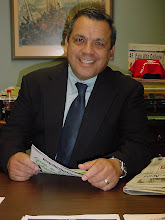Rob Hines' Study Abroad Update
THE FOLLOWING IS SENT ON BEHALF OF ROB HINES, WHO IS ALSO ON THE STUDY ABROAD PROGRAM IN EUROPE:
"Reporting" from Warsaw, Poland, this is Rob Hines, History department, sharing some observations and experiences here in Europe this spring.
Most of the students and faculty on the trip this spring have had little or no practical experience with the holocaust or the history of Europe. Everything we are hearing and seeing is new. I am a history teacher, and I have taught my students about World War II and the Holocaust for decades. I thought I knew something about this difficult subject. Simply put: there is absolutely nothing like being there. And we are here.
Presently, we are now in Warsaw, Poland, having completed our stay in Berlin Germany this morning. After a light dinner this evening at our hotel, the faculty asked students to participate in a discussion: Share with the group some of your impressions about the trip so far - something you leanrned or were surprised by.
A student of Dr. Dorothy Haeker and Karen Marcotte's, Kevin James, spoke about our visit to the Wannese Villa outside of Berlin . It was here that the Nazi regime in Germany made their plans for the so called "final sollution" - the mass murder of perhaps millions of European Jews. The information shared, the rooms toured, the pictures and transcripts we saw from this crucial meeting of Nazi leaders, all made a huge impression on Kevin. When he spoke, it was clear to me he had been changed by the experience. I was too. In a couple of days, we will visit the result of this crucial meeting of Nazi leaders - the killing center of Aushwitz, outside the Polish city of Cracow. After this tour, I will report back to the PAC community.
On a more personal note:
Despite some misgivings expressed by my wife Kimberly, I brought our 13 year-old student to Europe with me . The trip is changing him every day. He has been struck by the vast differences in economic activity (Eastern Europe is not wealthy by the standards of south central Texas). Internet service is slow; cars are smaller and slower. People live in apartments, for the most part. Polish kids don't talk on cell phones, because they don't have one. It's not a question of shock. Kids his age know the world isn't the same everywhere. It is more a matter of awareness: this is how it is here. And people live their lives as happily as "richer" Americans.
He grew up learning about the Holocaust, and has not been shocked by the information so far. I am wondering how he will react to our visit to the killing centers the day after tomorrow.
Thanks.
Rob Hines
"Reporting" from Warsaw, Poland, this is Rob Hines, History department, sharing some observations and experiences here in Europe this spring.
Most of the students and faculty on the trip this spring have had little or no practical experience with the holocaust or the history of Europe. Everything we are hearing and seeing is new. I am a history teacher, and I have taught my students about World War II and the Holocaust for decades. I thought I knew something about this difficult subject. Simply put: there is absolutely nothing like being there. And we are here.
Presently, we are now in Warsaw, Poland, having completed our stay in Berlin Germany this morning. After a light dinner this evening at our hotel, the faculty asked students to participate in a discussion: Share with the group some of your impressions about the trip so far - something you leanrned or were surprised by.
A student of Dr. Dorothy Haeker and Karen Marcotte's, Kevin James, spoke about our visit to the Wannese Villa outside of Berlin . It was here that the Nazi regime in Germany made their plans for the so called "final sollution" - the mass murder of perhaps millions of European Jews. The information shared, the rooms toured, the pictures and transcripts we saw from this crucial meeting of Nazi leaders, all made a huge impression on Kevin. When he spoke, it was clear to me he had been changed by the experience. I was too. In a couple of days, we will visit the result of this crucial meeting of Nazi leaders - the killing center of Aushwitz, outside the Polish city of Cracow. After this tour, I will report back to the PAC community.
On a more personal note:
Despite some misgivings expressed by my wife Kimberly, I brought our 13 year-old student to Europe with me . The trip is changing him every day. He has been struck by the vast differences in economic activity (Eastern Europe is not wealthy by the standards of south central Texas). Internet service is slow; cars are smaller and slower. People live in apartments, for the most part. Polish kids don't talk on cell phones, because they don't have one. It's not a question of shock. Kids his age know the world isn't the same everywhere. It is more a matter of awareness: this is how it is here. And people live their lives as happily as "richer" Americans.
He grew up learning about the Holocaust, and has not been shocked by the information so far. I am wondering how he will react to our visit to the killing centers the day after tomorrow.
Thanks.
Rob Hines


<< Home